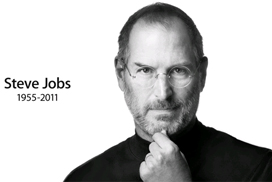Some lessons from the life of Steve Jobs

Steve Jobs, one of my all-time heroes died yesterday leaving behind a legacy. I am not used to writing eulogies. But there are some great lessons from his life to reflect on for us as individuals, organizations and businesses, to truly think beyond just building a product or a service.
In his long battle with cancer, he led his life asking himself everyday if that was the last day of his life, what he was going to do was really what he wanted to do. He also advised the Stanford freshmen on their commencement speech in 2005 to ask themselves this question often, to help them find what their true love is when it came to work.
I don’t believe you need to ask yourself everyday if you are changing the world, and I don’t think Jobs meant that either. In fact Jobs once said about what he did and I quote, “These technologies can make life easier, can let us touch people we might not otherwise. You may have a child with a birth defect and be able to get in touch with other parents and support groups, get medical information, the latest experimental drugs. These things can profoundly influence life. I’m not downplaying that. But it’s a disservice to constantly put things in this radical new light — that it’s going to change everything. Things don’t have to change the world to be important”.
So what is important? In my opinion, knowing your customer makes you understand the importance, purpose and meaning of your work – as an individual, as a product, as a service or as an organization. Mark Zuckerberg once noted while talking about importance of local news, “A Squirrel Dying in Your Front Yard May Be More Relevant to Your Interests Right Now than People Dying in Africa”. You don’t have to solve the greatest challenges of the century to impact people’s lives. You just need to listen to them really well.

Courtesy: Apple.com looked like this on the day of Steve Job’s Death
Have you heard of this little speech Steve Jobs reportedly used to give to a new Vice President at Apple?
Well in case you haven’t… Steve would say, if the garbage in his office is not being emptied regularly for some reason, he would ask the janitor what the problem is. The janitor could reasonably respond by saying, “Well, the lock on the door was changed, and I couldn’t get a key.” As a janitor, he’s allowed to have excuses. “When you’re the janitor, reasons matter,” he’d say, “somewhere between the janitor and the CEO, reasons stop mattering. In other words, you have no excuse for failure. You are now responsible for any mistakes that happen, and it doesn’t matter what you say.”
It might sound unreasonable especially since Steve Jobs is known to have been hands on and used to have a say in all things important about the products at Apple. The difference in his leadership was he was a great visionary and his vision was a guiding force to his team. He used to enable the team by showing the vision, but throwing open the world of possibilities.
[simple-social-share]


